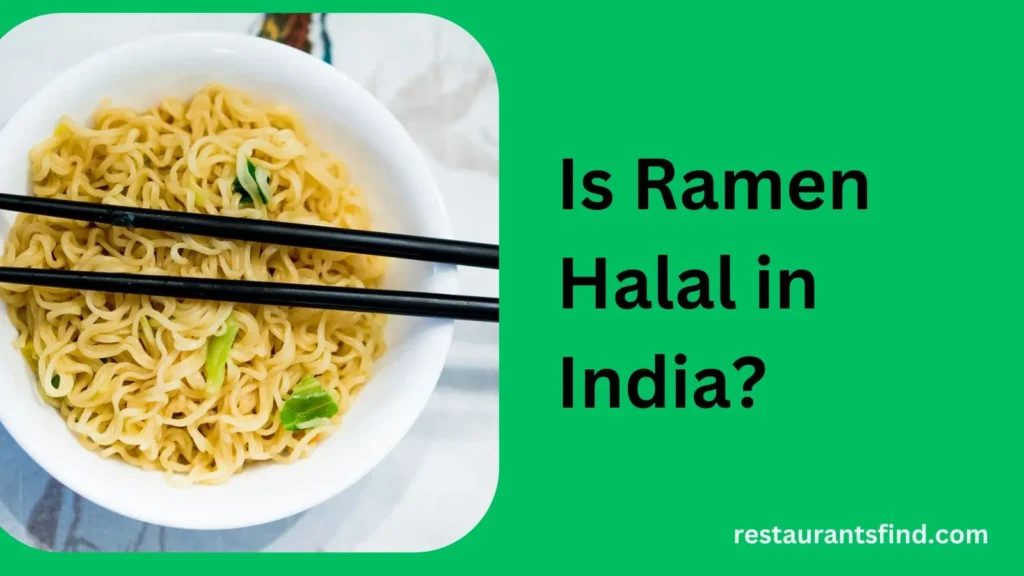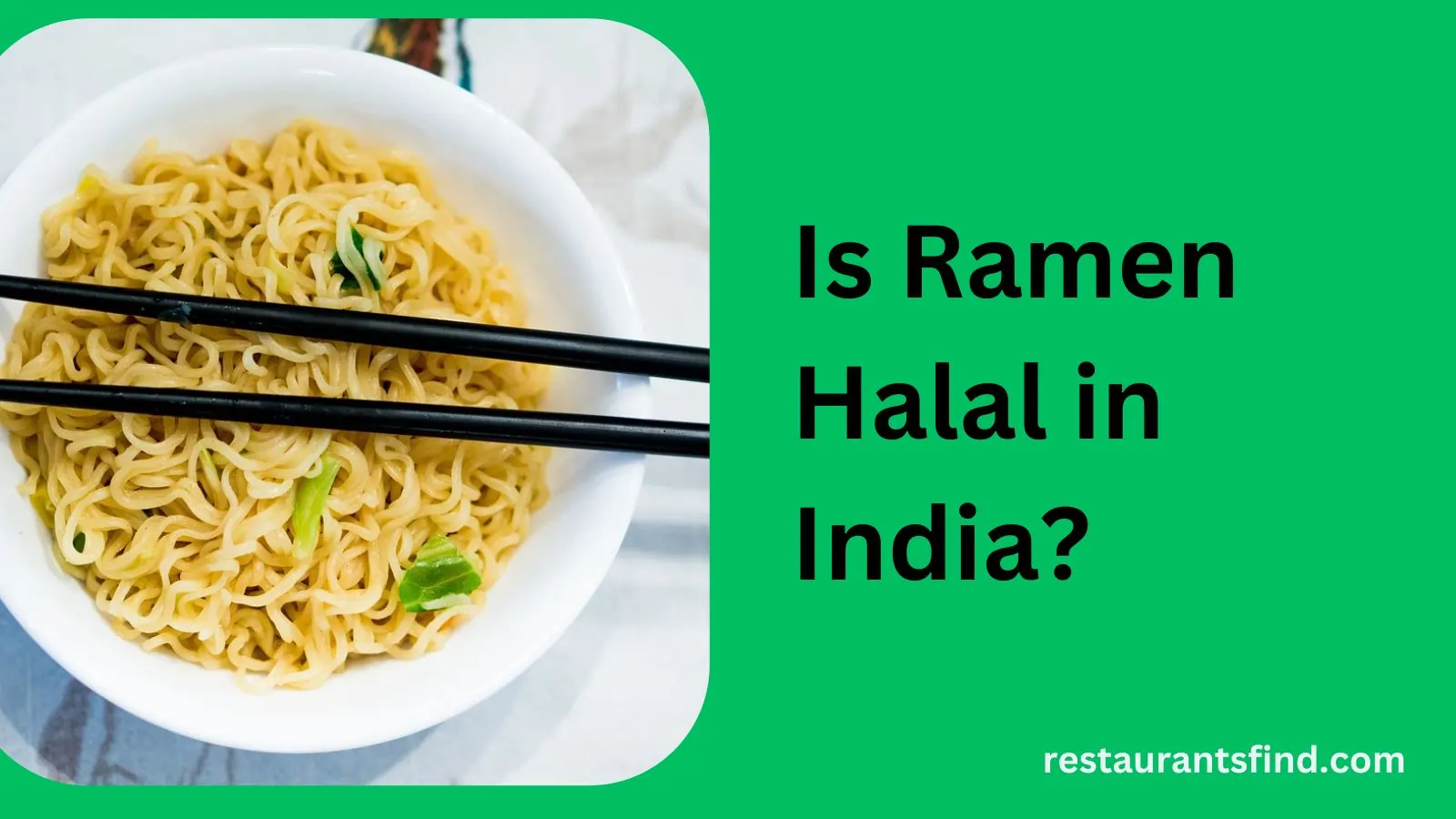Ramen is a widely enjoyed dish consisting of noodles in broth, often garnished with meat, eggs, and vegetables. While its origins lie in Japan, it has become popular in various countries, including India.
However, for Muslims adhering to halal dietary principles, the question arises: Is ramen halal in India? Halal encompasses a set of rules guiding Muslim daily life, including dietary practices.
These rules prohibit the consumption of certain foods like pork, alcohol, blood, and animals not slaughtered according to Islamic law. Additionally, halal standards mandate clean and hygienic preparation and handling, free from harmful or unlawful substances.

In this blog post, we’ll delve into the halal status of ramen in India and offer options for those seeking to enjoy this flavorful dish while staying true to their faith.
Halal Certification in India
One secure way to ensure that the food is halal is to look for a halal certification. It is a mark or label indicating that the food has undergone inspection and approval by a halal authority, such as a Muslim organization or a government agency. This certification assures consumers that the food meets halal requirements and is safe for consumption.
However, it’s important to note that halal certification is not mandatory in India, and there is no standardized system for it.
India has various halal authorities and agencies, each with its own criteria and certification methods. While some of these agencies are recognized by the government and affiliated with international halal organizations, others may not have such affiliations.
As a result, the quality and reliability of halal certification in India can vary depending on the source and scope of certification. Consumers should be vigilant and inquire about the certification’s credibility when seeking halal food options.
Ramen Ingredients
To determine the halal status of ramen, you need to examine its ingredients. This is the most reliant way to the halal status of any noodle. Ramen typically consists of noodles, broth, toppings, and seasonings.
1. Noodles
Ramen noodles are primarily made from wheat flour, water, salt, and sometimes eggs or kansui (alkaline water). All these ingredients are considered halal unless they’re contaminated with haram substances or processed in an unhygienic manner.
2. Broth
Broth is a must-check thing in the packet of Ramen if you’re priority halal. Ramen broth serves as the base of the dish and can be made from various ingredients like water, soy sauce, miso, salt, sugar, oil, spices, and stock.
The halal status of the broth hinges on the source and method of making the stock. If the stock derives from pork or animals not slaughtered according to Islamic law, then the broth is haram.
However, if the stock originates from halal meat or vegetables without haram additives or preservatives, then the broth is halal.
3. Toppings
Ramen toppings may contain meat, eggs, seafood, vegetables, mushrooms, seaweed, and cheese to enhance the taste and appearance of the noodles.
The halal status of toppings depends on their type and source. Pork or non-halal meat toppings are haram, while halal meat, eggs, seafood, or vegetables without haram additives or preservatives are halal.
This means if any ramen contains meat in its topping then you need to check out its halal status if doesn’t you can have it without any fear.
4. Seasonings
Ramen seasonings, such as salt, pepper, chili, garlic, ginger, vinegar, and sesame, are used to flavor the broth and toppings.
The halal status of seasonings is determined by their type and source. Seasonings containing alcohol or haram additives or preservatives are haram, while those without haram substances are halal.
Read: Is Pizza Hut Halal in India?
Halal Status of Ramen in India
Based on what we’ve looked at, whether ramen is halal or not in India depends on what it’s made of and how it’s made.
It could be halal or haram, depending on where the noodles, broth, toppings, and seasonings come from. So, it’s really important to check the ingredients and any certification before eating ramen.
But sometimes, it’s not easy to do that, especially if you’re getting ramen from a street vendor, a restaurant, or a store. They might not have the ingredient list or a halal label. And even if they do, it might be hard to know if it’s real or not.
So, in those cases, you might have to trust the person selling it or ask them more about what’s in it.
Therefore, most ramen is not halal by default, unless it is prepared with halal ingredients and methods.
Halal Ramen Options in India
If you’re looking for halal ramen in India, you’ve got a few options:
1. Buy Halal-certified Ramen Products
Look for ramen products with a halal certification from trusted halal authorities like Halal India, Jamiat Ulama-e-Hind, or the Halal Committee of India.
You can find these products online on websites like Amazon, Flipkart, or BigBasket, or in specialty stores such as Halal Mart, Halal Zone, or Halal Bazaar.
Check the websites or social media pages of these halal authorities for lists of certified ramen products and brands.
Some popular halal ramen brands available in India include:
- Samyang Instant Ramen Noodles: This Korean brand offers various spicy and flavorful ramen noodles certified halal by the Korea Muslim Federation. Examples include Samyang Buldak Chicken Cheese, Samyang Buldak Chicken Curry, and Samyang Buldak Habanero Lime Hot Chicken Ramen.
- Indomie Mi Goreng: This Indonesian brand is one of the most popular instant noodles globally and is 100% halal-certified by the Indonesian Ulema Council. It comes with different seasonings and condiments to create tasty stir-fried noodle dishes.
2. Visit halal-friendly Ramen Restaurants
Look for ramen restaurants that offer halal options or cater to halal customers. You can find these restaurants online using platforms like Zomato, Swiggy, or HalalTrip, or ask friends and family for recommendations.
Check reviews and ratings to see what other customers say about their halal experience. Examples of halal-friendly ramen restaurants in India include Ramen Hakata, Ramen Samurai, and Ramen House.
Conclusion
Ramen is a delicious and popular dish that can be enjoyed by anyone, including Muslims who follow halal dietary rules.
However, the halal status of ramen in India is not clear-cut and depends on the ingredients and the method of preparation.
It’s essential for individuals seeking halal options to carefully examine the ingredients and look for certification from reputable halal authorities.
While it may require some effort to find halal-certified ramen products or halal-friendly restaurants, it’s possible to enjoy this tasty dish while adhering to halal dietary guidelines in India.

